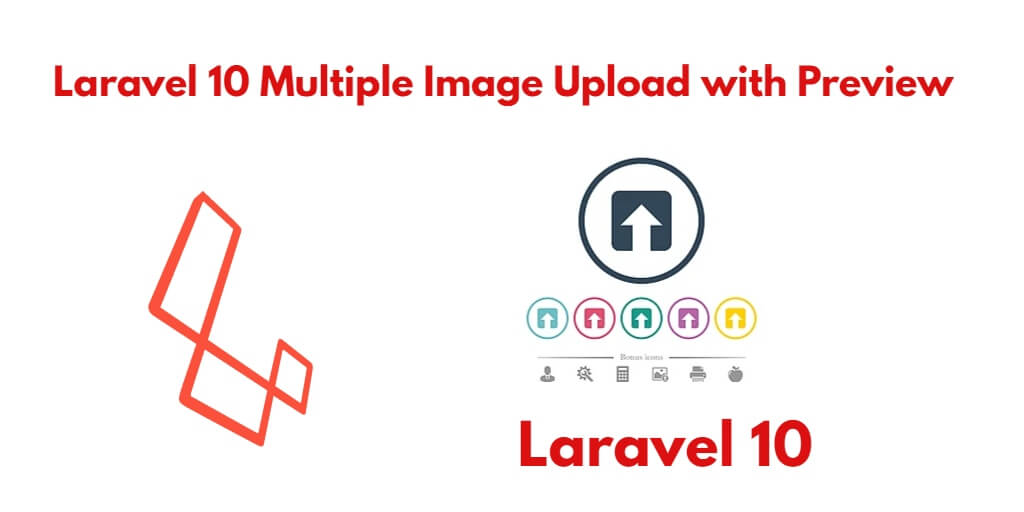If you want to implement functionality that allows users to preview multiple images before uploading them to the database and directories in your Laravel 10 web application, then this tutorial is for you.
So In this tutorial, you will learn how to show multiple image previews before uploading to the server in Laravel 10 application using jquery.
Laravel 10 Multiple Image Upload Preview Example
Steps to show multiple image previews before upload to server and directory in laravel 10 apps using jquery:
- Step 1 – Setup New Laravel 10 Application
- Step 2 – Setup Database with Laravel App
- Step 3 – Create Model & Migration
- Step 4 – Add Routes
- Step 5 – Generate Controller using Artisan Command
- Step 6 – Create Blade View
- Step 7 – jQuery Code To Show Multiple Image Preview
- Step 8 – Start Development Server
- Step 9 – Start App on Browser
Step 1 – Setup New Laravel 10 Application
Firstly, open your terminal and execute the following command into it to download or install Laravel 10 new setup on your system:
//for windows user cd xampp/htdocs //for ubuntu user cd var/www/html
Then install Laravel 10 latest application using the following command:
composer create-project --prefer-dist laravel/laravel blog
Step 2 – Setup Database with Laravel App
In this step, Add your database details with Laravel app. So, visit to Laravel app root directory and find .env file. Then set up database details as follows:
DB_CONNECTION=mysql DB_HOST=127.0.0.1 DB_PORT=3306 DB_DATABASE=db name DB_USERNAME=db user name DB_PASSWORD=db password
Step 3 – Create Model & Migration
In this step, execute the following command on terminal or command prompt to create photo migration and model file:
php artisan make:model Photo -m
The above command will create two files into your Laravel 10 multiple image upload with validation tutorial app, which is located inside the following locations:
- blog/app/Models/Photo.php
- blog/database/migrations/create_photos_table.php
So, find create_photos_table.php file inside blog/database/migrations/ directory. Then open this file and add the following code into function up() on this file:
public function up()
{
Schema::create('photos', function (Blueprint $table) {
$table->id();
$table->string('title');
$table->string('path');
$table->timestamps();
});
}
Now, open again your terminal and type the following command on cmd to create tables into your selected database:
php artisan migrate
Step 4 – Add Routes
In this step, open your web.php file, so navigate inside routes directory. Then update the following routes into the web.php file:
use App\Http\Controllers\UploadImagesController;
Route::get('upload-multiple-image-preview', [UploadImagesController::class, 'index']);
Route::post('upload-multiple-image-preview', [UploadImagesController::class, 'store']);
Step 5 – Create Controller using Artisan Command
In this step, Execute the php artisan command on command line or terminal to create a controller:
php artisan make:controller UploadImagesController
The above command will create the UploadImagesController.php file, which is located inside blog/app/Http/Controllers/ directory.
So open the UploadImagesController.php file and add the following code to it:
<?php
namespace App\Http\Controllers;
use Illuminate\Http\Request;
use App\Models\Photo;
class UploadImagesController extends Controller
{
public function index()
{
return view('images-upload-form');
}
public function store(Request $request)
{
$validateImageData = $request->validate([
'images' => 'required',
'images.*' => 'mimes:jpg,png,jpeg,gif,svg'
]);
if($request->hasfile('images'))
{
foreach($request->file('images') as $key => $file)
{
$path = $file->store('public/images');
$name = $file->getClientOriginalName();
$insert[$key]['title'] = $name;
$insert[$key]['path'] = $path;
}
}
Photo::insert($insert);
return redirect('upload-multiple-image-preview')->with('status', 'All Images has been uploaded successfully');
}
}
Step 6 – Create Blade Views
In step this, Go to resources/views directory. And then create a new blade view file named images-upload-form.blade.php inside this directory.
So, open this images-upload-form.blade.php file in text editor and update the following code into it:
<!DOCTYPE html>
<html>
<head>
<title>Laravel 10 Upload Multiple Image With Preview using jQuery - Tutsmake.com</title>
<meta name="csrf-token" content="{{ csrf_token() }}">
<link rel="stylesheet" href="https://stackpath.bootstrapcdn.com/bootstrap/4.5.2/css/bootstrap.min.css">
</head>
<body>
<div class="container mt-5">
@if(session('status'))
<div class="alert alert-success">
{{ session('status') }}
</div>
@endif
<style>
.images-preview-div img
{
padding: 10px;
max-width: 100px;
}
</style>
<div class="card">
<div class="card-header text-center font-weight-bold">
<h2>Laravel 10 Upload Multiple Image With Preview - Tutsmake.com</h2>
</div>
<div class="card-body">
<form name="images-upload-form" method="POST" action="{{ url('upload-multiple-image-preview') }}" accept-charset="utf-8" enctype="multipart/form-data">
@csrf
<div class="row">
<div class="col-md-12">
<div class="form-group">
<input type="file" name="images[]" id="images" placeholder="Choose images" multiple >
</div>
@error('images')
<div class="alert alert-danger mt-1 mb-1">{{ $message }}</div>
@enderror
</div>
<div class="col-md-12">
<div class="mt-1 text-center">
<div class="images-preview-div"> </div>
</div>
</div>
<div class="col-md-12">
<button type="submit" class="btn btn-primary" id="submit">Submit</button>
</div>
</div>
</form>
</div>
</div>
<script src="https://code.jquery.com/jquery-3.5.1.min.js"></script>
<script >
$(function() {
// Multiple images preview with JavaScript
var previewImages = function(input, imgPreviewPlaceholder) {
if (input.files) {
var filesAmount = input.files.length;
for (i = 0; i < filesAmount; i++) {
var reader = new FileReader();
reader.onload = function(event) {
$($.parseHTML('<img>')).attr('src', event.target.result).appendTo(imgPreviewPlaceholder);
}
reader.readAsDataURL(input.files[i]);
}
}
};
$('#images').on('change', function() {
previewImages(this, 'div.images-preview-div');
});
});
</script>
</div>
</body>
</html>
Step 7 – jQuery Code To Show Multiple Image Preview
In this step, implement the jQuery code to display or show multiple images preview before upload to database and directory in laravel app:
<script src="https://code.jquery.com/jquery-3.5.1.min.js"></script>
<script >
$(function() {
// Multiple images preview with JavaScript
var previewImages = function(input, imgPreviewPlaceholder) {
if (input.files) {
var filesAmount = input.files.length;
for (i = 0; i < filesAmount; i++) {
var reader = new FileReader();
reader.onload = function(event) {
$($.parseHTML('<img>')).attr('src', event.target.result).appendTo(imgPreviewPlaceholder);
}
reader.readAsDataURL(input.files[i]);
}
}
};
$('#images').on('change', function() {
previewImages(this, 'div.images-preview-div');
});
});
</script>
Step 8 – Start Development Server
In this step, run the following command on cmd to start the development server:
php artisan serve
Step 9 – Start App on Browser
In step this, run this app on browser, so open your browser and fire the following url into browser:
http://127.0.0.1:8000/upload-multiple-image-preview
